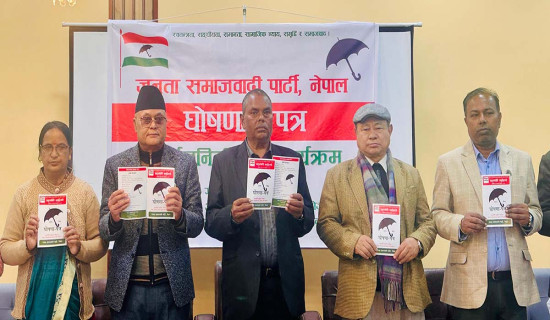- Friday, 13 February 2026
International Women’s Day
Bridge Digital Gender Gap
A mother of a minor girl called me one day to say that her daughter was being harassed by somebody on the mobile and that he was threatening to expose her nude picture on Facebook. She needed help and didn’t know where to go. Knowing that the Nepal Police has a cybercrime department, I guided her to register her complaint there. Reluctant in the beginning, the woman and her husband finally registered their harassment case. It took some time for the police to track this person who was threatening the minor by saying that if she did not allow him to do what he wanted, he would kill her parents.
With this threat he got her to click her naked picture and send him. The child did so as she feared that her parents would be killed. Then the man kept threatening her of exposing her picture. Finally, with the help of the police, her family was rescued and justice rendered.
However, in this digital age, there are more and more people, especially girls and women, who are being bullied, harassed and even trafficked via the social media and the organised crime syndicate. Every year, March 8 is celebrated all over the world as the International Women’s Day (IWD). This year the UN Women has taken up the theme “DigitAll: Innovation and technology for gender equality”.
Digital exclusion
This theme has been taken to align with the priority theme of the upcoming 67th Session of the Commission on the Status of Women which is “Innovation and technology change, and education in the digital age for achieving gender equality and the empowerment of all women and girls.” Owing to the pandemic, girls from the low-income families were expected to drop out of school by more than 53 per cent. Also, the pandemic has changed the education system and a lot of education and awareness is now done digitally. The lack of inclusion of children from digital apparatus and education comes with a massive cost.
According to the UN Women’s Gender Snapshot 2022 report, exclusion of women from digital world has taken away $ 1 trillion from the GDP of low- and middle-income countries during the last decade. This loss is expected to grow to $ 1.5 trillion by 2025. The same report mentions that reversing this trend will require addressing the online violence. A study of 51 countries reveals 38 per cent of women have personally experienced such violence. As the digital age advances, if proper attention is not given, the digital gender divide will increase and this will not be productive for the next generation.
Digital education is the reality of today, therefore proper measures must be taken to make sure all have access to this. Girls and women usually are left behind in technological skills. A gender-responsive approach to innovation, technology and digital education will help to increase the awareness of girls and women regarding their rights and civic engagements. It is also important to educate children on the harms of the digital age and how digital crimes happen. There are several cases of drug, sex and human trafficking done via the digital means. A syndicated network is hosting such organised crimes and many fall prey to it. Tracing it is very difficult as the individuals running such operations are very skilled and well-connected.
While the UN Women theme, this year has embraced the need to make sure girls and women do not get left behind in digital education. The IWD website has taken up the theme of #EmbraceEquity. It is important and essential to have equity. Just having equal opportunity is not enough. There are people from different situations and communities. Therefore, it is important to make sure that extra measures are taken to make sure that there is true inclusion. For this, there must now be more focus on equity as well as equality. In 1948, American women, Cady Stanton and Lucretia Mott, congregated a few hundred people to protest against the fact that they were barred from speaking at anti-slave convention.
This was the first women’s rights convention in New York. Together they demanded civil, social, political and religious rights for women in a Declaration of Sentiments and Resolutions. The feminist movement was thus born. In 1945, the UN Charter became the first to affirm the principles of equality between men and women. On March 8th 1975, UN for the first time, officially observed the International Women’s Day and recognised it on 1977 as a result of the labour movement at the turn of the twentieth century in North America and across Europe. Since then, several countries have formulated and amended laws in favour of women.
Restrictions
However, it is a fact that violence against girls and women and the struggle for their rights is still continuing. Still the world is witnessing atrocities like the ones created by the Taliban by banning girls’ education and imposing strict restrictions on their daily existence. Women are still killed for not wearing Hijabs and women professional in every sector still struggle to get equal pay and a harassment free work environment. Rape cases are increasing and perpetrators are mainly men from the family.
The countries have failed to make homes, work places, open spaces and the whole society a safe place for girls and women. On top of that, data shows that in every profession and personal life girls and women are the ones facing maximum violence in the digital sphere. Therefore, it is important to keep this year’s IWD theme of DigitAll: technology for all and #EmbraceEquity at the center so that girls and women like those mentioned in the case above do not get deprived of digital skills to access their rights and save themselves from facing violence of any form.
(Namrata Sharma is a journalist and women rights advocate. namrata1964@yahoo.com Twitter handle: @NamrataSharmaP)
















-original-thumb.jpg)
